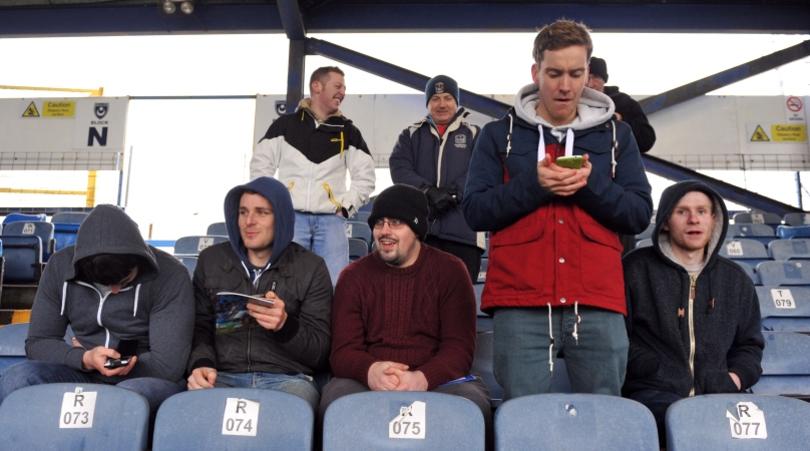Is there even a case for Everton keeping Marco Silva now? The jury's out
In the bottom half, one win in six and no sign of improvement on the horizon. Just how patient is Farhad Moshiri?
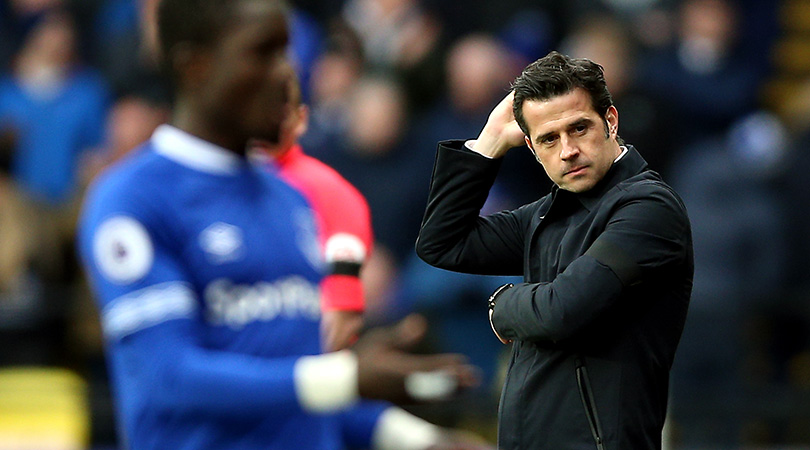
“In this business, you have to hold your nerve.”
One of the most influential men on Merseyside football was talking. It wasn’t a reference to so-called bottlers or the stress that Liverpool’s title challenge confers. It was Farhad Moshiri, speaking last month. Or, to put it another way, a month after he said Everton’s league position was “just not good enough”. They were 11th then. They are 11th now.
There are different types of pressure. Everton’s comes from mid-table underachievement. They have four remaining home games, three of which are against the top six. They have four wins in 17 league matches; in that time, 17 teams have more and only the doomed duo of Fulham and Huddersfield have fewer.
Moshiri sacked Ronald Koeman after a run of one win in eight top-flight outings, and when his team had finished seventh five months earlier. His nerve is now being tested by Marco Silva.
Blue education
Everton don’t want a reputation as the club who went from School of Science to School of Panic. They hoped their days as knee-jerk reactionaries ended when the increasingly reactionary Sam Allardyce was sacked.
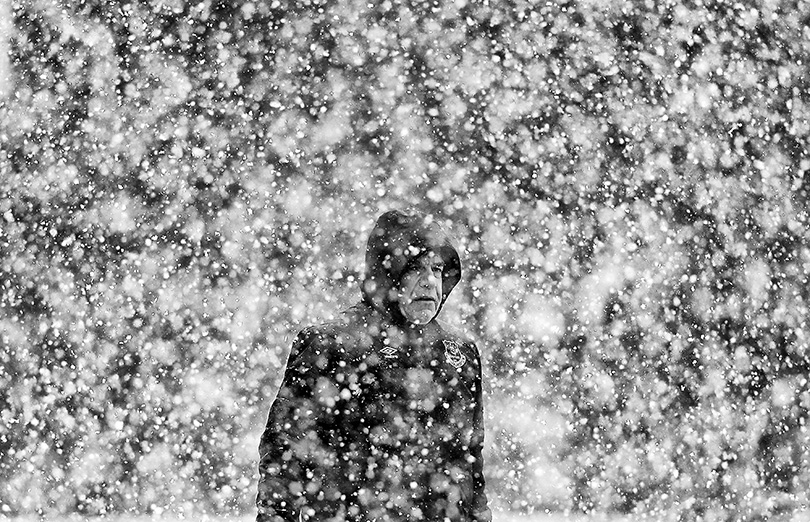
“Marco Silva is a talented coach but he's planning long-term,” Moshiri stated recently.
Get FourFourTwo Newsletter
The best features, fun and footballing quizzes, straight to your inbox every week.
Silva ticked boxes: young, ambitious, with an attacking style of football. He was a coach Everton wanted so much that they sacrificed last season with Allardyce’s caretaker reign, and paid Watford £4 million in compensation.
Everton need continuity, not a hire-and-fire culture; a squad forged and finessed over several years of careful planning, not an expensive hotchpotch of a group cobbled together by different managers and powerbrokers.
Yet the circumstances feel damning. Saturday felt very much like the end of Roberto Martinez’s reign, of the way his Everton snatched defeat from the jaws of victory against West Ham in 2016. Once again, a 2-0 lead was transformed into a 3-2 loss. Everton’s summer decision threatens to be more awkward and more agonising.
What now?
Because the worst-case scenario is that Everton limp on before, amid more crowd unrest, they have another October sacking and another wasted year. And so an assessment beckons.
It’s undeniable that Silva has made Everton more entertaining, more attack-minded and more prolific. There is a comparatively recent example of an undistinguished first year on Merseyside giving way to an infinitely superior second: Brendan Rodgers at Liverpool. There is the example that Estoril progressed in Silva’s second and third campaigns, even if it has to be set against the fact that he hasn’t lasted into a sophomore season anywhere else; the long-term plans are in the hands of a short-term specialist.
There would be reputational and financial damage from sacking Silva, with another pay-off and another manager wanting to sign his own players.
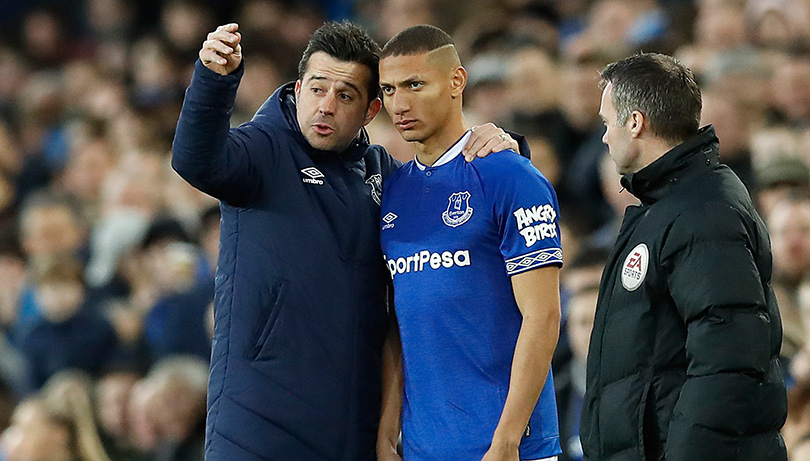
But there’s a cost even to keep the current squad, given that Andre Gomes and Kurt Zouma are only on loan and their purchase prices could amount to £50 million. It feels harder to justify when perhaps only Richarlison of Silva’s signings qualifies as a success; even then, though very gifted, he is an expensive, inconsistent and has just two goals against top-half opponents since the opening day.
Bernard and Gomes have flattered to deceive, Lucas Digne has fared better going forward than in his own half, and the reality that Zouma has outperformed the £28 million Yerry Mina is worrying in itself.
Soft centre
That remodelled rearguard has been breached far too often; that Everton have conceded the most set-piece goals in the division speaks to a failure of their zonal-marking system; that Gomes leaves the back four unprotected and Idrissa Gueye overworked is a recurring problem.
Everton kept successive clean sheets when the stylish Portuguese was benched. He was recalled at Newcastle and they conceded three. Style has been prioritised over substance and solidity.
Tom Davies has been sidelined in the process. Silva has made noises about trusting young players, and such faith does tend to offer reason for reciprocation in a coach. But Davies figured more for Allardyce, Mason Holgate has been dispatched on loan to West Brom, Ademola Lookman has only been granted three Premier League starts and Dominic Calvert-Lewin feels underused for a player averaging a goal every 194 minutes (and the older Cenk Tosun overused for one every 467).
Tosun’s underwhelming return is a theme. Theo Walcott has used his speed to regress rapidly. Jordan Pickford has had a troubled time after a stellar year. Seamus Coleman has fought admirably for fitness, but has rarely reached the levels he touched before injury. Gueye hasn’t recaptured the form he displayed in his first season at Goodison Park.
It would be wrong to blame Silva for all of that but, coupled with Mina and Digne’s defensive difficulties and Bernard and Gomes’s lack of productivity, there’s scarcely a pattern of improvement an admired coach would want just as Everton, eighth last season, are in the bottom half now.
Silva can point to players who have delivered more this season than last: Michael Keane, though not back to the standard he showed under Sean Dyche; Gylfi Sigurdsson, producing more goals after being installed in his best position, even if his performances were arguably consistently better under Swansea’s unholy trinity of Francesco Guidolin, Bob Bradley and Paul Clement; Richarlison, who didn’t score for Watford after his mentor’s dismissal.
Future promise?
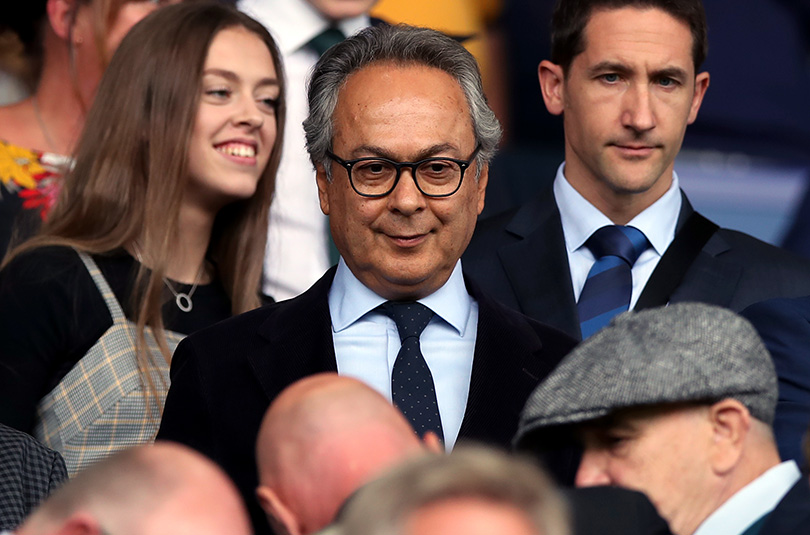
Yet Everton offer the sense of untapped potential and of expenditure not being reflected in results. That doesn’t help a manager’s cause; it offers the question if someone else could extract more, much as Javi Gracia has done at Vicarage Road.
Silva’s past can be held against him, and not merely by Hornets fans. His spells at Hull, Watford and Everton have had common denominators, of fine starts followed by relapses in results, albeit in wildly different circumstances.
So the evidence may be unflattering. Managers can be sustained by a promise of progress in transitional seasons and Silva has to offer a brighter future when, by the owner’s own admission, the present is unsatisfactory.
There is no doubt that, unlike with Allardyce, Everton’s preference is to stick with him. But if the truism is that managers need time, Moshiri has been reluctant to give it to those he has deemed the wrong choices. And while Silva could be championed or condemned, there are reasons to argue either case. It’s not just about Moshiri’s nerve, but his judgement.
Richard Jolly also writes for the National, the Guardian, the Observer, the Straits Times, the Independent, Sporting Life, Football 365 and the Blizzard. He has written for the FourFourTwo website since 2018 and for the magazine in the 1990s and the 2020s, but not in between. He has covered 1500+ games and remembers a disturbing number of the 0-0 draws.
